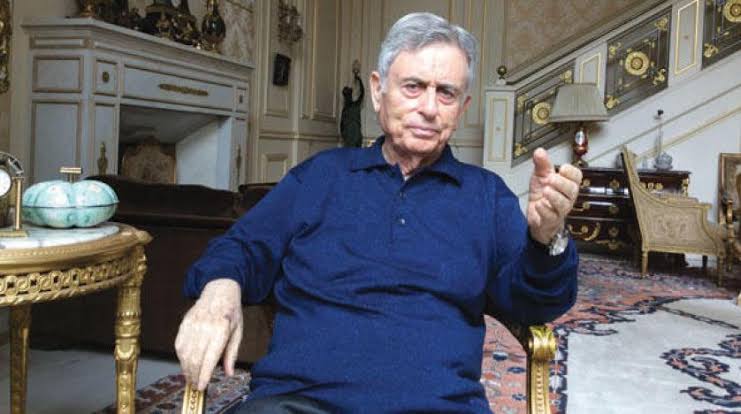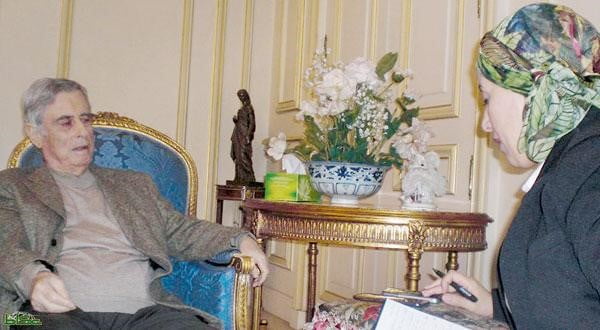Iran Plans to Control the East… and the Weapons of Mass Destruction Bring Down Bashar
Former Syrian Vice President Abdul Halim Khaddam emphasized in an interview with “Okaz” that the Assad regime has started resorting to sectarian elimination in the coastal areas with the aim of establishing the Alawite entity in Homs.
Khaddam held the world responsible for what is happening in Syria, considering that if Washington wanted to resolve the Syrian crisis, it would have done so a long time ago. He warned of the growing Iranian influence in Syria, calling on Arab countries to intervene to stop the Iranian expansion, affirming that Iran’s goal is to control the Middle East, with Syria as the gateway.
Now to the details of the interview:
• Being from Banias, the regime committed a horrifying massacre in Al-Bayda a week ago. What is the regime’s need for more bloodshed?
I assure you that the number of those killed in the village of Al-Bayda exceeds 600 victims, not as reported in the media as tens. The regime’s forces used artillery and naval bombardment to strike this city, then the Shabiha elements entered and committed the massacre. The real goal of this massacre is to displace the Sunnis from this area and all the coastal areas. The regime has been working for a while to create the geographical and security environment to establish the Alawite state. The recent massacre comes within this context, but Assad will not be able to displace the Sunnis from their areas.
• Do you think the regime is considering staying again after all of this?
The regime is trying in every possible way to remain in any form. Bashar believes that establishing the Alawite state will protect him from the Syrian people. The Assadist plan is to control Homs as the center of the Alawite state, with the Alawite corridor extending from the coastal areas in the north to Homs in the center, all the way to northern Lebanon in the south, along the borders of the Mediterranean Sea. This explains Hezbollah’s recent involvement in the war in Syria.
• Can you enlighten us about the regime’s thinking regarding the Alawite state?
The Assad regime is sectarian by nature, and it has never considered anything other than the sectarian approach. It believes that emptying the coastal areas of Sunnis will pave the way for the establishment of its state. It sees Syria fragmenting, with the northern areas in Aleppo and Idlib being devastated by destruction and bombardment, as well as the eastern region in Deir ez-Zor being stripped of all the essentials of life. Only the coastal areas of Tartus and Latakia remain, to be connected to Homs. Assad believes that this way he can protect himself.
• Will the world accept this idea, especially since it won’t resolve the conflict but will lead to more killing?
The world does not care about what is happening in Syria. America lives in a different world. Although they are aware of the danger of the situation, they do not act according to the severity of the situation in Syria. In my view, America wants to hand the region over to the Iranians.
• If America really wants to hand the region over to the Iranians… what about Israel?
Iran has never threatened Israel’s security in its history. I can assure you that Iran is a strong guarantee for Israel’s security. Iranian-Israeli dealings began after the 1979 Iranian Revolution, when Iran supported it with weapons.
• To this extent, does Iran control the Syrian regime?
I can say that Iran currently holds the decision-making power in Syria, in agreement with Russia. Even in the field, Iran plays the main role. There is confirmed information that the military operations rooms in Homs and other cities where intense fighting is taking place are under the control of Iranian Revolutionary Guard officers.
• How do you expect the Syrian officers to react to this provocative intervention?
Most of the military and intelligence leadership in the army are Alawites, and in one way or another, they follow Assad’s behavior, who handed the state over to Iran. I can say that 90% of the army and intelligence leadership are Alawites. Iran entered and took control of the regime, managing the conflict. This was done with the support of elements from the Lebanese Hezbollah.
• But recently, America provided some aid to the rebels. What’s your comment?
What aid is this?! Food and medicine?! Does the Syrian revolution and the Free Syrian Army need food and non-lethal weapons? This is not assistance; it’s escaping from responsibility for what is happening in Syria. The Syrians don’t want food; they want real, advanced weapons to overthrow the Bashar regime. The American excuse of the presence of extremists is false. How can they use extremism as an excuse and not stop the killing? Which is more dangerous? America doesn’t want to intervene and provides justifications. They talk about protecting the minority and fearing extremists in the next phase after Assad’s fall. If that’s the case, who will protect the Sunni majority from the regime’s killings? These are entirely illogical approaches.
• So, what is the international requirement for the Syrian crisis?
As I see it and based on the events on the ground, there is a consensus on the dismantling of Syria and the destruction of the state, because Syria’s historical role in the region must disappear.
• Does this mean that the Syrian state has come to an end?
There is still a glimmer of hope to preserve Syria if there is substantial military assistance from Western countries, particularly the United States. If provided, the rebels are capable of tipping the balance of the conflict. They can expel Iranian influence and cut off Iran’s path. Syrians do not want to overthrow the state; they want to overthrow the regime. However, Bashar al-Assad is working to bring down everything in Syria.
• Britain announced that it would arm the opposition if European consensus isn’t reached. Do you trust these promises?
They have linked arming the opposition to the regime’s use of chemical weapons. They stated that they will arm the opposition if the regime resorts to using chemical weapons against its people. This implies further hesitance.
• Let’s move to the Syrian opposition, specifically the head of the coalition, Mouaz al-Khatib. What is your political assessment of his performance, especially his initiative for dialogue with Assad?
Regardless of doubting al-Khatib’s patriotism and integrity, he is not competent to manage political affairs and has committed serious political mistakes. He is a mosque preacher and does not grasp the intricacies of political work. After his resignation from the coalition, it seems that he has burnt his bridges. Neither al-Khatib nor anyone else should engage in any political process with Assad. Syrians will not accept any political process that keeps Assad, regardless of the cost.
• So, what is your overall assessment of the political opposition and its political makeup?
The coalition does not represent the Syrian people and has no popularity inside the country. There are attempts to expand it in the future, which is a positive effort. However, what is required of the coalition is more political balance. Certain groups and entities control it, and this does not serve the Syrian revolution. There is concern that the coalition may become a tool for negotiations with the regime. Thus, it needs true national figures that represent the opinions of Syrians inside the country.
• Finally, how can the Syrian crisis be resolved?
I have said on multiple occasions that the resolution can happen in two ways. The first is an international coalition led by the United States that strikes the regime’s vital military sites. Due to the absence of this option, the second alternative is real and substantial arming of the opposition. Without these two approaches, Syria will drown in more bloodshed and division.



